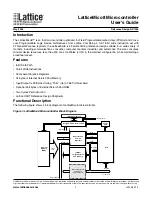
Publication 1764-UM001A-US-P
Replacement Parts
B-3
Battery Handling
Follow the procedure below to ensure proper battery operation and reduce personnel hazards.
•
Use only for the intended operation.
•
Do not ship or dispose of cells except according to recommended procedures.
•
Do not ship on passenger aircraft.
Storing
Store lithium batteries in a cool, dry environment, typ20
°
C to +25
°
C (+68
°
F to 77
°
F) and
40% to 60% humidity. Store the batteries and a copy of the battery instruction sheet in the
original container, away from flammable materials.
Transporting
One or Two Batteries
Each battery contains 0.23 grams of lithium. Therefore, up to two batteries can be shipped
together within the United States without restriction. Regulations governing shipment to or
within other countries may differ.
Three or More Batteries
Procedures for the transportation of three or more batteries shipped together within the United
States are specified by the Department of Transportation (DOT) in the Code of Federal
Regulations, CFR49, “Transportation.” An exemption to these regulations, DOT - E7052, covers
the transport of certain hazardous materials classified as flammable solids. This exemption
authorizes transport of lithium batteries by motor vehicle, rail freight, cargo vessel, and
cargo-only aircraft, providing certain conditions are met. Transport by passenger aircraft is not
permitted.
A special provision of DOT-E7052 (11th Rev., October 21, 1982, par. 8-a) provides that:
“Persons that receive cell and batteries covered by this exemption may reship them pursuant
to the provisions of 49 CFR 173.22a in any of these packages authorized in this exemption
including those in which they were received.”
The Code of Federal Regulations, 49 CFR 173.22a, relates to the use of packaging authorized
under exemptions. In part, it requires that you must maintain a copy of the exemption at each
facility where the packaging is being used in connection with shipment under the exemption.
Shipment of depleted batteries for disposal may be subject to specific regulation of the countries
involved or to regulations endorsed by those countries, such as the IATA Articles Regulations of
the International Air Transport Association, Geneva, Switzerland.
ATTENTION
!
•
Do not charge the batteries. An explosion could result or the cells could
overheat causing burns.
•
Do not open, puncture, crush, or otherwise mutilate the batteries. A
possibility of an explosion exists and/or toxic, corrosive, and flammable
liquids would be exposed.
•
Do not incinerate or expose the batteries to high temperatures. Do not
attempt to solder batteries. An explosion could result.
•
Do not short positive and negative terminals together. Excessive heat can
build up and cause severe burns.
IMPORTANT
Regulations for transportation of lithium batteries are periodically revised.
Содержание micrologix 1500
Страница 1: ...MicroLogix 1500 Programmable Controllers Bulletin 1764 User Manual AB Spares...
Страница 6: ...Publication 1762 RM001A US P Preface P 4...
Страница 52: ...Publication 1764 UM001A US P 3 16 Wiring Your Controller...
Страница 78: ...Publication 1764 UM001A US P 5 10 Using Trim Pots and the Data Access Tool DAT...
Страница 96: ...Publication 1764 UM001A US P B 6 Replacement Parts...
Страница 102: ...Publication 1764 UM001A US P C 6 Troubleshooting Your System...
Страница 132: ...Publication 1764 UM001A US P F 10 System Loading and Heat Dissipation...
Страница 147: ...AB Spares...
Страница 149: ...AB Spares...















































